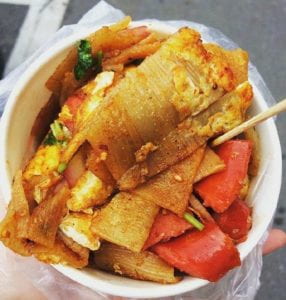“What a weird city Beijing is.”
The first time when I arrived in my college in Chaoyang District in Beijing, from Shanghai, four years ago, I was murmuring to myself.
Before coming to Beijing in-person, my knowledge toward Beijing was the dignifying Tiananmen Squire and talkative Beijing grandpas with a sense of justice and a honorable accent, most of which came from media image. To my surprise, dirty streets, rugged sidewalk, and mixed flowing population consist of an image around my college, Communication University of China.
As you can see from the image, our college is located in far away from the center of the city.Relatively low living cost (including rent and price of product) attract as many immigrants as possible to settle down, living here together with us college students.
What was our students’ most unforgettable experience was hanging out with classmates or boyfriend/girlfriend along the west street after class, usually it was evening. Multiple flavor street food was made by people from different places. They talk to us passionately, asking our preference, who wants more sauce and who prefers less spicy. My favorite was a snake called roast noodles, which was the Northeast characteristic (see picture below). Plenty of smell consist of a pleasant symphony, just as the ballet mentioned by Jacobs in The Death and Life of American Cities.
However, inevitable noise ofter break-in. Those vendors along the west street had to confront with city guards. Although they set a we-chat group to share information about when and where city guards would show up, increasingly severe policy left no space for them to survive through making street food. Once one or two city guards appeared, a marathon competition would be put up immediately in the west street. Those who were caught by city guards, their production tools would be certainly confiscated, which, very likely, to be the majority of their properties. What’s worse, around 2000RMB fine, approximately their monthly income, is needed. Being caught by a city guard means a catastrophe to them.

As pre-journalists, we interviewed many of the vendors, trying to help them through our shallow experience and knowledge. However, books and research tell us that, it is impossible to save mobile vendors from the reorganization of cities.(see relevant news release by CUC-Action, which belongs to School of Journalism)
The major concern with street food is certainly, sanitary problem. According to an informal survey, among vendors around our college, nobody could provide his or her health certificate, not to say their food. It really shocked us when somebody claimed that the woman who sold Yunnan Rice was probably suffering from hepatitis B, though not proved to be true, students were not encouraged to buy street food by school official.
As a result, street food disappeared as well as some small mobile vendors, and the west street became drab and dour since last year. Although street trading was encouraged this year, to relive unemployment problems brought by Covid-19, I don’t think street food will prosper again like it used to be. Time has changed, without consciousness.
Leave a Reply